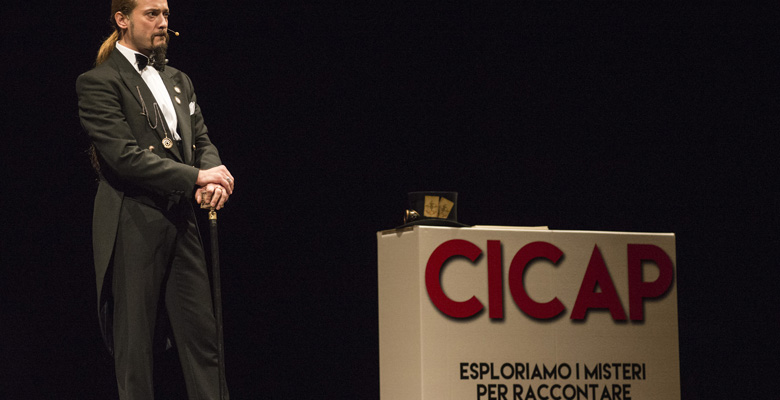Forensic scientists versus psychic detectives

Forensic scientist, debunker of psychics, lecturer, expert witness and magician are not generally considered to have commonalities - rarely do they describe the work of one individual.
In addition to his academic work as Principal Lecturer in Forensic Anthropology, and forensic duties as an expert witness, the School of Natural Sciences and Psychology's Dr Matteo Borrini debunks psychics who try involve themselves in forensic investigations, and has learnt the art of magic to help decode their strategies.
Such is his expertise that Dr Borrini is regularly asked to deliver talks at international conferences, demonstrating how, with an awareness of how ‘magic’ is conducted and good showmanship, it is possible to create an illusion of communicating with the dead, and seemingly provide the correct answers thought only to be known by the deceased, revealing supposedly unknown personal details. Armed with this knowledge, he ousts those who claim to be using their paranormal powers to find missing people and channelling murder victims to find their killers.
Dr Borrini is one of the few British fellows of the American Academy of Forensic Sciences (AAFS). During the AAFS’s annual scientific meeting, attended by more than 4,000 forensic scientists and practitioners, Dr Borrini was invited to talk about the ‘Forensic Paranormal’ and analysed some of the most infamous cases of psychic detectives, including the Dutch Gerard Croiset, the American Sylvia Browne, and the Italian Lake Soothsayer.
He outlined how the main methods used by psychic sleuthing have been exposed, such as hot and cold reading, and general assertions that originate from the Barnum/Forel effect (the sitter recognises himself in a vague psychological profile or description which is general enough to apply to a wide range of people).
Dr Borrini also criticised the role of the media in the myth-making process, commenting that they create apparently successful psychic detectives by not raising awareness of the non-paranormal methods they use, not reporting the more frequent, unsuccessful performances and by implying that they are officially involved in investigations. As part of the presentation he also gave the audience of largely forensic scientists a mediumistic experience, showing how they too could be deceived by so-called psychic detectives.
Dr Borrini is also a long-standing scientific consultant of the Italian sceptic society CICAP and delivered a similar teaching-act at the 25th anniversary event 2015 CICAP. In addition, he is a member of the Liverpool Magic Circle and the Liverpool Mahatma Magic Circle, where he was recently awarded the Austin Wand, a recognition presented each year to the person who has contributed most to the Circle.
Dr Borrini explains: “Being a magician helps me to debunk alleged psychic detectives, exposing their methods and demonstrating that I can replicate their stunts. I can give the illusion of being able to control a paranormal phenomenon; I can let the audience experiment with the same experience with the art of magic, without them having any psychic ability. It is important that people understand how psychics use the tricks of conjurers not to entertain people, but to milk personal drama, such as a recent loss, which can sometimes be emotionally distressing.
“I try to follow the path of teaching through entertaining and provocation, giving spectators with the emotional experience a psychic delivers, but simultaneously demonstrating that it is possible to produce the same effects with no paranormal power. They become eyewitnesses of an apparently inexplicable event - but they know that there is a rational explanation behind it.
"In this way the scientific message delivered by the lecture will be more strongly fixed in the audience’s mind by the emotional experience. Sometimes science is deemed as boring and therefore, as scientists, we have to find a way to grab the attention of people, engaging their heart as well as their brain.”


